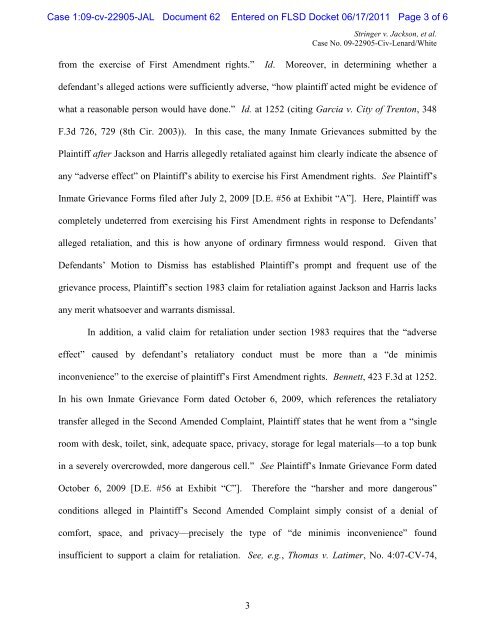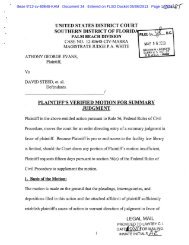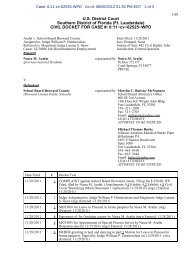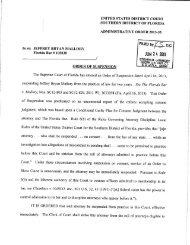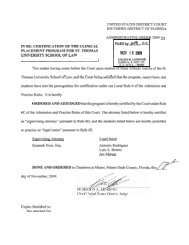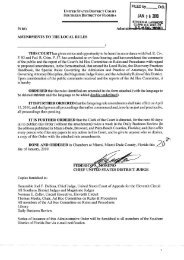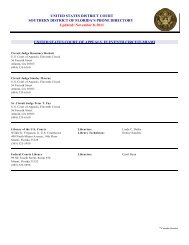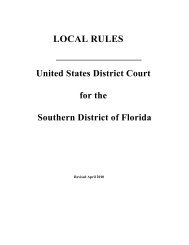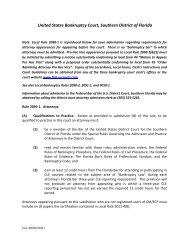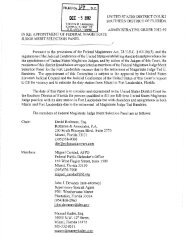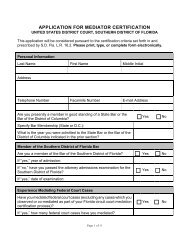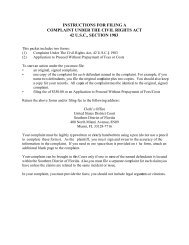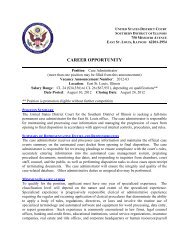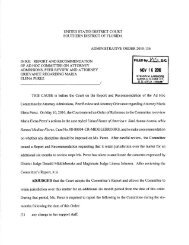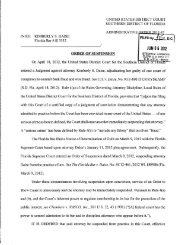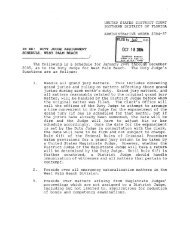US District Court Southern District of Florida (Miami) - United States ...
US District Court Southern District of Florida (Miami) - United States ...
US District Court Southern District of Florida (Miami) - United States ...
Create successful ePaper yourself
Turn your PDF publications into a flip-book with our unique Google optimized e-Paper software.
Case 1:09-cv-22905-JAL Document 62 Entered on FLSD Docket 06/17/2011 Page 3 <strong>of</strong> 6<br />
3<br />
Stringer v. Jackson, et al.<br />
Case No. 09-22905-Civ-Lenard/White<br />
from the exercise <strong>of</strong> First Amendment rights.” Id. Moreover, in determining whether a<br />
defendant‟s alleged actions were sufficiently adverse, “how plaintiff acted might be evidence <strong>of</strong><br />
what a reasonable person would have done.” Id. at 1252 (citing Garcia v. City <strong>of</strong> Trenton, 348<br />
F.3d 726, 729 (8th Cir. 2003)). In this case, the many Inmate Grievances submitted by the<br />
Plaintiff after Jackson and Harris allegedly retaliated against him clearly indicate the absence <strong>of</strong><br />
any “adverse effect” on Plaintiff‟s ability to exercise his First Amendment rights. See Plaintiff‟s<br />
Inmate Grievance Forms filed after July 2, 2009 [D.E. #56 at Exhibit “A”]. Here, Plaintiff was<br />
completely undeterred from exercising his First Amendment rights in response to Defendants‟<br />
alleged retaliation, and this is how anyone <strong>of</strong> ordinary firmness would respond. Given that<br />
Defendants‟ Motion to Dismiss has established Plaintiff‟s prompt and frequent use <strong>of</strong> the<br />
grievance process, Plaintiff‟s section 1983 claim for retaliation against Jackson and Harris lacks<br />
any merit whatsoever and warrants dismissal.<br />
In addition, a valid claim for retaliation under section 1983 requires that the “adverse<br />
effect” caused by defendant‟s retaliatory conduct must be more than a “de minimis<br />
inconvenience” to the exercise <strong>of</strong> plaintiff‟s First Amendment rights. Bennett, 423 F.3d at 1252.<br />
In his own Inmate Grievance Form dated October 6, 2009, which references the retaliatory<br />
transfer alleged in the Second Amended Complaint, Plaintiff states that he went from a “single<br />
room with desk, toilet, sink, adequate space, privacy, storage for legal materials—to a top bunk<br />
in a severely overcrowded, more dangerous cell.” See Plaintiff‟s Inmate Grievance Form dated<br />
October 6, 2009 [D.E. #56 at Exhibit “C”]. Therefore the “harsher and more dangerous”<br />
conditions alleged in Plaintiff‟s Second Amended Complaint simply consist <strong>of</strong> a denial <strong>of</strong><br />
comfort, space, and privacy—precisely the type <strong>of</strong> “de minimis inconvenience” found<br />
insufficient to support a claim for retaliation. See, e.g., Thomas v. Latimer, No. 4:07-CV-74,


